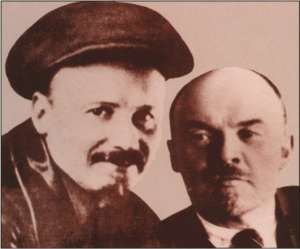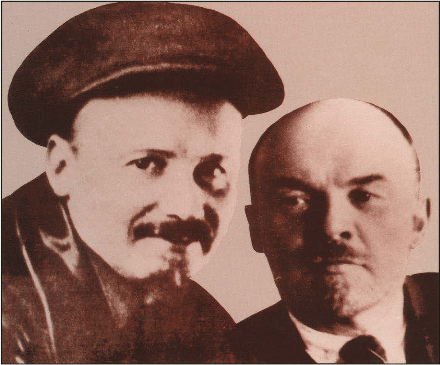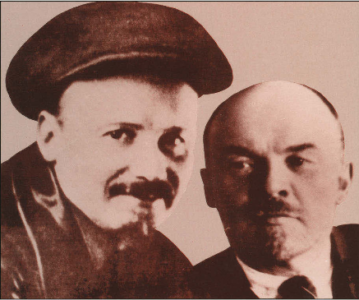Translation by Mark Alexandrovic. The original publication was prepared by Cherny, Andrey Vitalievich, head of the department of the Museum of the Revolution.

Introduction
The author of the letters published below, N. I. Bukharin, since 1911, fleeing exile, was abroad, where he joined the Bolshevik faction of the RSDLP (Russian Social Democratic Labour Party), collaborated with its leadership, corresponded with V. I. Lenin and G. E. Zinoviev, taking an active part in developing the revolutionary strategy and tactics of the Bolsheviks.
After the Berne conference of foreign Bolshevik groups in February 1915 at which Bukharin criticized a number of provisions of Lenin’s program of party activity in the war, relations between them deteriorated but did not come to a break. Having moved to Stockholm in July 1915, Bukharin is working on an article “The World Economy and Imperialism”, trying to give justification for his position on a number of program issues. His correspondence with Lenin also continues. At the time when the published letters were being written, the Bolsheviks openly proclaimed their goal to be a pan-European and then a world socialist revolution. The revolution in Russia was seen by them as only one stage of the coming world revolution. It is from this point of view that the prospects of the Russian revolution are discussed in the letters.
Lenin’s reply letters to Bukharin have not yet been found. However, from Bukharin’s letters the position of the leader of the Bolsheviks on the questions under discussion is clearly visible. It becomes apparent that Lenin had already at that time opposed the convening of a Constituent Assembly, insisting on an interim revolutionary government which should have come to power by decree to implement the Bolshevik minimum program (democratic republic, 8-hour work day, confiscation of landed estates), and the Constituent Assembly should then already have approved the government decisions, drafted the constitution, etc.
While generally agreeing with this point of view, Bukharin, as can be seen from his letters, remained then still in a more “moderate”, “conservative” position on this issue, respecting in his calculations certain generally accepted “conventions”: a parliamentary republic, legitimization of revolutionary law-making by a majority of people’s representatives, etc.
The sharpest disagreements between Bukharin and Lenin arose when discussing two other points of the Bolsheviks’ program of action after their eventual rise to power: on the export of the revolution, or, as Bukharin writes, on the “protection of the revolution,” and on the future of socialism in Russia, Bukharin linked the prospects of European and Russian revolution to the success of revolutionary invasion, particularly of Germany. While on the question of the invasion both sides agreed, except for specifics, Bukharin’s scheme for socialist transformation in Russia provoked criticism from Lenin and Zinoviev, who accused Bukharin of “subjectivism” and “Trotskyism. Subsequent developments suggest the high degree of correlation of the policies discussed then to the policies pursued by the Bolsheviks after October 1917. The published letters are in the Russian Center for Custody and Study of Documents of Contemporary History, Lenin’s collection (F. 2, op. 5, d. 781 – letters to Lenin from other individuals). Both letters were written in Bukharin’s hand and sent by him from Stockholm in the autumn of 1915. Bukharin began writing the first one on August 26 (September 2) and finished it on September 27 (October 10), 1915. The second has no definite date, and was dated not earlier than July 1915. It is difficult to agree with this dating. From a comparison of the texts of both letters, it is clear that it was written later. In it he continues the polemic with Lenin and Zinoviev on the questions raised in the first letter and responds to their criticisms. Thus, the second letter cannot be more precisely dated — not earlier than October 1915. Both letters are published with slight abbreviations that do not affect the substance of the problem in question. A transcription of the author’s abbreviations is given in square brackets. Bukharin’s underlining with one line is in italics, two lines with extra letter spacing, and three lines in bold.
A. V. CHERNY.
Letter from N. I. Bukharin to V. I. Lenin
Begun on August 26 (September 2), ended on September 27 (October 10), 1915
Dear Vladimir Ilyich ! [ … ] Now I want, at least briefly, to reply to your letter.
- On the question of the military-industrial committees etc. I agree completely.1
- On the question of the Constituent Assembly not quite. I agree that it is sneaky to keep quiet about who will convene the Constituent Assembly. The “thesis” of a provisional government is mandatory. I agree that the three whales2 should be first and foremost. But, in my opinion, this does not contradict the slogan of the Constituent Assembly with proper references (i.e., to a revolutionary) government). Indeed. We say: Democratic Republic. But a democratic republic presupposes its own “constitution”. (As we say in the program: “A democratic republic whose constitution provides” followed by the minimum program.) But just as one cannot be silent about who will call a constituent assembly, one cannot be silent about who will work out the constitution of the republic. Clearly, the provisional government is not in a position to do this. We need Richtlinien3— so we need the slogan of a Constituent Assembly. This is a matter of principle. Secondly, “practical” considerations: In the proclamations you received (I hope) there is this slogan exhibited by our PC4, it has already apparently taken root along with the 3 whales. And, in my opinion, there is nothing wrong with it, if it is precisely put into proper perspective.
- The “guarding the revolution” clause. I too used to think of saying “propagation” instead of “guarding”. But I “removed” this word out of caution. The fact is that I am afraid whether our revolutionary invasion of Germany will be reflected in such a way that, for a variety of reasons, it will cause a rise in nationalist sentiments (“ces cohortes barbaris etc.”)5. Besides, troops of the nation are 9/10 peasants6. It seems to me that our “invasion” is only possible here if we have the consent of the German leftist workers who know the mood of the Germans. Idem7 and about Asia, where similar considerations play an even greater role. Hence some caution is necessary in language. In essence I have nothing against your idea.
- Regarding the provisional government, I agree with absolut8.
Now one “concretization”. Suppose this situation: We are in power, we offer peace. It is accepted, but on the condition that, say, Poland is annexed to Germany. Do we then reject peace? And if it depends on the number of concessions, how should we proceed? Where are the boundaries? I, to tell you the truth, don’t know what to do here. Write, please, what you think about it. It seems to me that the question should be solved together with the left-wing Germans. (Then): only if we do not break the solidarity here, if we act with the consent of the German workers. (By the way: in vain Grigory9 writes in the pamphlet that we certainly do not interfere in the affairs of foreign parties (regarding the actions of the opposition). Precisely, we must and are now obliged to “interfere.” Even Axelrod10 says this in his pamphlet “Die Krise d S-d-tie”). [ … ]
Now one purely interesting question, for my solution of which you will scold me terribly. I am keeping it to myself, but it seems to me that we need to have a debate about it. Namely, we are talking about socialism in Russia (i.e., the socialist revolution). Why have we always been against socialist revolution? Because there are no “objective prerequisites,” an agrarian country, a colossal number of peasants, fragmented trades and productive forces in general etc. And that was quite true. But this, in my opinion (I do not affirm it positively yet, but I am gradually moving toward such “anarchism”) is true as long as we regard Russia as an isolated state and economy. In the revolution of 1905, there was not much hope of a European revolution. Now the situation is quite different. Now, if not today, then tomorrow we have a pan-European, if not a worldwide fire. But the social revolution in the West is breaking down the nation-state boundaries. And we have to support her in this regard.) Why on earth would we want to keep a sharply demarcated state of “Russia”? What is the purpose of this? On the contrary, we will try to centralize, to meld the whole of Europe (as a first stage) in all respects. And if this is so, why should we hold on to “local particularities” and leave the bourgeoisie in power, which tomorrow (for liberalism = imperialism) will be more dangerous than rotten Czarism for the West. Objectively, it is quite possible to incorporate our big industry and capitalist estates + factories which process agricultural products into the pan-European socialist system, especially as this system (since it concerns a very developed syndicated industry in Russia) is already organizationally linked via European banks. We will make the peasants dependent through the industrialization of agriculture.
They will not go against us, or rather, they will be indifferent. And even if we were able to get rid of them all together in Europe. We would strangle Russian imperialism with our socialism. One more thing: maybe Siberia would have separated from us. Well, God be with her! I confess that I do not see “an inch of anarchism” in all this construction. If you do not see “not an inch of Marxism” here, please write > or < a detailed motivation. I certainly don’t intend to put all of these considerations into any print etc, but I would like to clarify the issue for myself without reservations, since I don’t see any arguments against it. Naturally, all of the above can also be substantiated statistically. [ … ]
Here’s another interesting question. There is no doubt that since 1905 our situation has changed greatly, mainly in the sense that the question of patriotism has come up. You are absolutely correct in pointing out that we will not go along with patriots, even if they are “revolutionary”. It is important for us now to put a thousand times more emphasis on the proletarian-internationalist side of things. But what about the peasants? After all, their evaluation, too, must undergo a certain modification (compare at least the question of the provisional government now!). All this is extremely new. Well, all the best for now.
Н. Bukharin (M. Dolgolevsky)11 to V. I. Lenin and G. E. Zinoviev
[not before the middle of October 1915], Stockholm.
[ … ] Now a somewhat belated reply to Ilyich and Grigory’s letter on tactics.
- Constituent Assembly. V. I. writes in reply to my remark that the Provisional Right cannot elaborate the constitution of the Republic: “I think that it can and must at once not only develop, but introduce. And it will be up to the Constituent Assembly to elaborate, systematize, and approve it.” Of course, the provisional government introduces. But what? It only introduces some radical measures from the field of our program. But it does not implement a democratic republic in itself; the latter assumes a worked out and developed democratic parliamentary system, special basic laws ratified by the majority of representatives, i.e. by the Constituent Assembly. About the essence, i.e. concerning the connection with 3 whales, I agree (and this is the main thing). That we “confiscate” etc. and the Constituent Assembly approves — this is correct. I absolutely agree with Grigory’s statement.
- With the invasion of Germany without the consent of the left, V. I., in my opinion, is wrong. After all, it means that there are no such elements that will act with us; it will mean the rise of nationalism, the inhibition of the revolutionary struggle, an even greater split of the proletariat. We invade Germany only if we have the sympathy of the German workers, at least the best part of them, for our revolutionary mission. Grigory seems to agree with me on this point *.
- I do not fall into Trotskyism in the slightest degree, because I do not deny at all the bourgeois-democratic coup (confiscation, etc.). This is not the point (Grigory makes the same reproach, by the way), but this: if we have the prospect of transforming a bourgeois-democratic revolution into a socialist revolution (and “in the course of the conjuncture” the composition of the revolution’s driving forces will change), then shouldn’t we develop these prospects now in propaganda, agitation, etc. This is the question. Or should we proceed here according to the “theory of stages” a la Akimov?12
- By God, I am not guilty of subjectivism; if we say “why should we leave the bourgeoisie in power,” etc., then it is a fаcоn dе pаrler13, behind which there is no subjective reasoning at all. After all, Grigory himself admits the possibility of a victory even over Plekhanov + Kerensky14, ergo15 a proletarian dictatorship.
- In 1905, of course, this was not at all what was expected of the European revolution. It is axiomatic that the Russian revolution of 1905 developed in an unfavorable international environment. Now it will develop in a favorable environment. In other words, the “hopes” in both cases are quite different.
PPP. Is it true that you now use the term “Bukharinovshchina” and that Ilyich “denied” a minimal program at one of the meetings?
* He writes that “the state of mind of European workers must be appropriate etc.”16
- Lenin advocated the tactic of boycotting the military-industrial committees.
- “Three Whales” — the main slogans of the minimum program of the RSDLP: democratic republic, 8 hour workday, confiscation of landed estates.
- Richtlinien (German) – directives.
- PC — St. Petersburg (Petrograd) Committee of the RSDLP.
- “Ces cohortes barbaris etc” (Lat.) hordes of barbarians.
- The words “our troops are 9/10 of peasants” are underlined by Lenin, he put an exclamation mark after these words, and in the margin he made a note “that’s right”.
- Idem. (Lat.) — also.
- absolut (Lat.) — absolutely, unconditionally.
- Grigory — Zinoviev G. Е.
- P. B. Axelrod (1850 – 1928), one of the leaders of the Mensheviks.
- Bukharin went to Sweden with documents in the name of M. Dolgolevsky.
- Akimov (Makhnovets) VP (1872–1921) — right-wing Menshevik.
- Facon de pаrler (French) — a turn of phrase.
- Meaning the political bloc of defencists: the Mensheviks and SRs.
- ergo (Latin) – therefore.
- Next to the note there is a note by Lenin’s hand: “Exactly!”




